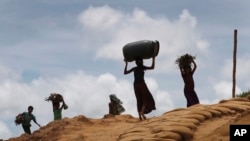The International Organization for Migration reports thousands of Rohingya refugees in Bangladesh’s Cox’s Bazar are at risk of falling prey to human traffickers who exploit them sexually and for forced labor.
Around one million Rohingya live in cramped, squalid camps in Cox’s Bazar. More than 700,000 have fled there since August, escaping violence and persecution in Myanmar. In their haste to leave, most have arrived in Bangladesh with nothing more than the clothes on their backs.
The International Organization for Migration says their destitution and lack of job opportunities make them extremely vulnerable to human traffickers. It says women and girls are at particular risk of being trafficked into the sex trade and of being violently abused.
IOM spokesman Paul Dillon told VOA women and girls as young as 11 are vulnerable to being trafficked as domestics in slave-like conditions.
“There is a burgeoning cottage industry of manufacturing where you have many young men who are looking for work who are also very much at risk of being exploited in those kinds of work environments where they are under-paid, they are forced to endure long hours of work. In some cases, they are not allowed to return home with any regularity,” he said.
Because of the clandestine nature of the crime, IOM has identified only 78 victims of trafficking in the past 10 months. But the U.N. Migration agency notes this represents just a fraction of the true number. It says it has a lot of anecdotal evidence that thousands are at risk from all forms of trafficking.
IOM is the lead agency coordinating the fight against human trafficking in Cox’s Bazar. Dillon said the agency is scaling up its counter trafficking activities. These include protection, prevention, psychological and material aid to survivors, and legal assistance to victims.







